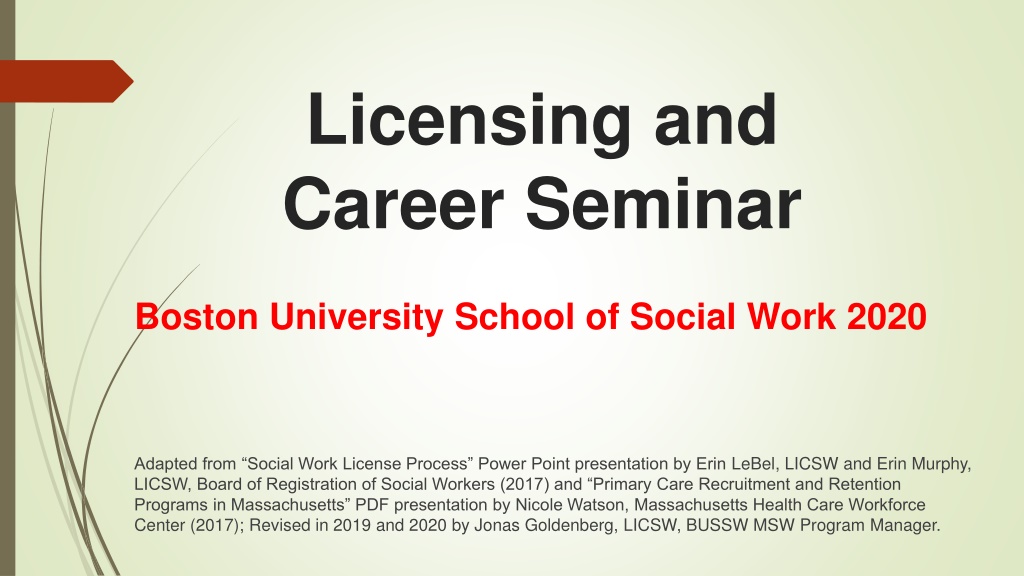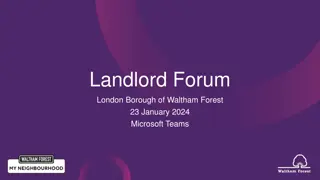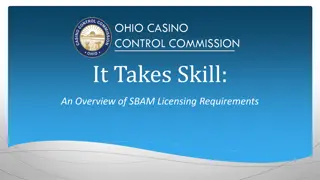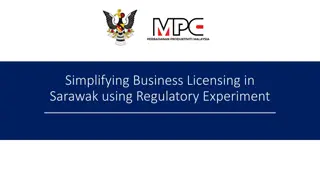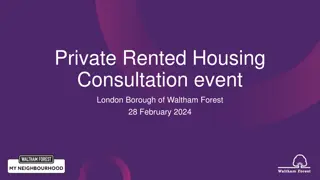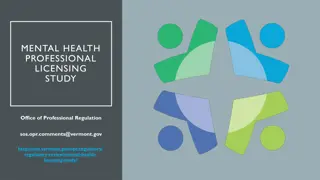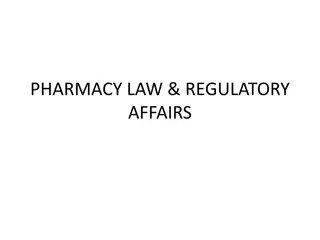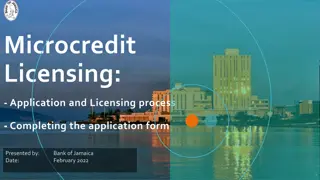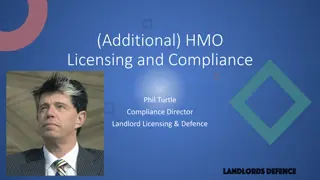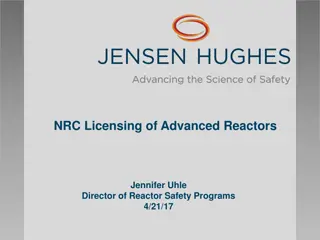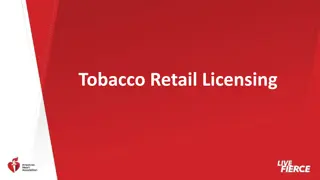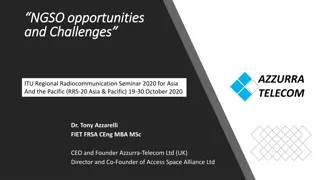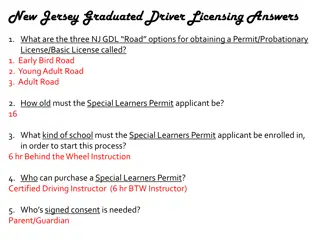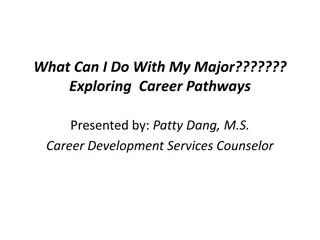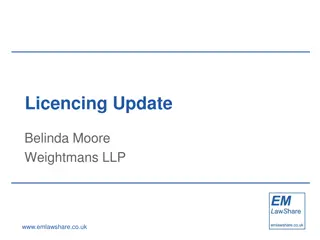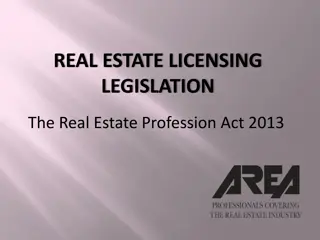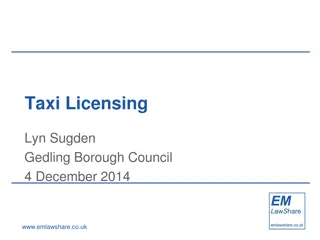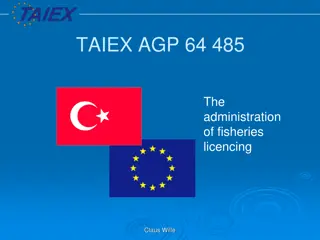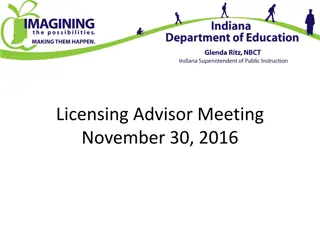Licensing and Career Seminar
Information on licensing process for social work professionals, including requirements, application steps, and Board of Registration of Social Workers. Learn about licensing exams, supervision, and documentation needed for LCSW and LICSW licenses. Understand the importance of education, experience, and references in obtaining social work licenses in Massachusetts.
Download Presentation

Please find below an Image/Link to download the presentation.
The content on the website is provided AS IS for your information and personal use only. It may not be sold, licensed, or shared on other websites without obtaining consent from the author.If you encounter any issues during the download, it is possible that the publisher has removed the file from their server.
You are allowed to download the files provided on this website for personal or commercial use, subject to the condition that they are used lawfully. All files are the property of their respective owners.
The content on the website is provided AS IS for your information and personal use only. It may not be sold, licensed, or shared on other websites without obtaining consent from the author.
E N D
Presentation Transcript
Licensing and Career Seminar Boston University School of Social Work 2020 Adapted from Social Work License Process Power Point presentation by Erin LeBel, LICSW and Erin Murphy, LICSW, Board of Registration of Social Workers (2017) and Primary Care Recruitment and Retention Programs in Massachusetts PDF presentation by Nicole Watson, Massachusetts Health Care Workforce Center (2017); Revised in 2019 and 2020 by Jonas Goldenberg, LICSW, BUSSW MSW Program Manager.
Who is the Board of Registration of Social Workers? Consumer protection agent of the Commonwealth Protect consumers by establishing and enforcing regulations Licensure requirements, standards of practice, etc. LICSWs, LCSWs, LSWs, Community/Consumers Enforces regulations via the complaint and discipline process Issues licenses and audits for license compliance Continuing Education Units (CEUs), supervision, etc. Volunteer members appointed by the Governor hold monthly meetings Each state has it s own Board Each Board has different requirements and processes for licensing
Which License and When? Education Examination References Supervision Documented Experience Licensed Certified Social Worker (LCSW) Apply as soon as you graduate! Hours towards your LICSW do NOT count until you have your LCSW! ASWB Masters Exam references (1 LCSW or LICSW) Licensed Independent Clinical Social Worker (LICSW) Apply after obtaining required experience and supervision ASWB Clinical Exam references by professionals licensed at the highest level in their field (LICSW, LMHC, PhD, MD, RNCS) MSW, DSW, or PhD in Social Work 2 professional 1 second year placement supervisory reference (LCSW or LICSW) 2nd / Advanced Year placement MSW, DSW, or PhD in Social Work 2 professional 1 supervisory reference by an LICSW (Supervisor must be licensed in the state in which the license is being sought in. In MA out-of-state supervisor must be LICSW eligible) No less than 2 years (3500 hours) of experience post- LCSW plus 100 hours of supervision (50 per year) by an LICSW. Hours do not all have to be at the same agency or by the same supervisor
What is the Process for Licensing? Part I 1. 2. You MUST have your MSW BEFORE you apply for your license in MA! Before graduation read the instructions, begin the application process Explore the ASWB website: https://www.aswb.org/ (copy/paste into browser) a. Read Candidate Handbook: https://www.aswb.org/wp- content/uploads/2013/12/Candidate-Handbook.pdf (copy/paste into browser) b. i. Excellent source of information and instructions Call ASWB (866/527-2384) or download application http://www.mass.gov/ocabr/licensee/dpl-boards/sw/forms/ or apply online at: https://www.aswb.org/exam-candidates/exam-registration/ (copy/paste into browser) c. If you apply online, you will be able to track the status of your application 3. After graduation (like the day after ) complete and submit application! i.
Application Requirements You will need the following items to apply for you license: Notarized application Completed and waived Reference Forms Official sealed transcript stating you have graduated with the MSW Payment for the license Signed and notarized criminal history acknowledgement form (CORI will be done) Complete required Domestic Violence training (see next slide) Passport-sized photograph Passing score on the Licensing Exam (you must pass before your license application can be finalized by ASWB and the MA Board of Registration of Social Workers)
Required PRIOR to Licensing Chapter 260: Training in Domestic, Sexual Violence Pursuant to M.G.L. c. 112, 264, applicants and licensees shall participate in at least one domestic violence and sexual violence training as a condition for licensure, renewal, revival or reinstatement of licensure. In conjunction with the Department of Public Health, the Board of Registration of Social Workers has approved this training for use to meet this requirement. The Board has determined that licensees may use this training to meet 2 credits of their required continuing education. To take a course other than the one listed above, the course must be approved by the Department of Public Health and one of the following recognized entities: NASW (naswma.org), CSWE accredited school or college, National Association of Black Social Workers (nabsw.org), or the ASWB (aswb.org). Free, online training from DPH: https://chapter260training.org/courses/training/ Approximately 1.5 hours Completed sections can be saved and completed within a 30-day period You will receive a Certificate of Completion, but no continuing education units (CEUs)
What is the Process for Licensing? Part II Apply for your license (see previous slide for required items you will need) Receive approval to take exam (within about 2 weeks) Register for the exam via ASWB https://www.aswb.org/exam-candidates/exam-registration/ (copy/paste to browser) a. Must wait 1 week to schedule test date b. Locations throughout MA; Many days and times available to take test PASS the exam!!!! a. You will receive a printed unofficial score report before you leave the testing center. This is the only document you will receive regarding your score. Please retain a copy of this unofficial score report for your records the report cannot be duplicated. Pay for license **NOT LICENSED UNTIL YOU ACTUALLY PAY FOR YOUR LICENSE** Receive license 1. 2. 3. 4. 5. 6.
The Exam Computer-based exam taken at a specified testing sites (i.e. Boston, Wellesley, Cambridge, Worcester, Springfield) Reservations may be made online at www.pearsonvue.com/aswb Call for reservations: 877-884-9537 (8am-11pm M-F, 8am-5pm Sa, 10am-4pm Su) 170 multiple choice questions (150 count towards exam grade) 4 hour testing window Broken down into 11 content areas (see next slide) Scaled score of 75% is MA s passing score (don t worry about the number score, if you pass, you PASS! no one will know your actual score except you) 2018 USA: 75.5 pass rate / 2017 USA: 81.2% pass rate 2016 MA: 89.5% pass rate 2018 BUSSW: 93% pass rate / 2017 BUSSW: 97% pass rate Special accommodations available for candidates with disabilities and ESL candidates
ASWB Masters Exam Content - 2020 Identifies your knowledge, skills, and abilities in the following areas: 1. Human Development, Diversity, and Behavior in the Environment 27% a. Human Growth and Development b. Concepts of Abuse and Neglect c. Diversity, Social/Economic Justice, and Oppression 2. Assessment and Intervention Planning 24% a. Biopsychosocial History and Collateral Data b. Assessment Methods and Techniques c. Intervention Planning 3. Interventions with Clients/Client Systems 24% a. Intervention Processes and Techniques for Use Across Systems b. Intervention Processes and Techniques for Use with Larger Systems 4. Professional Relationships, Values, and Ethics 25% a. Professional Values and Ethical Issues b. Confidentiality c. Professional Development and Use of Self Complete Outline: https://www.aswb.org/wp-content/uploads/2017/04/2018-Masters.pdf
Masters (LCSW) Exam Sample Questions 1. A social worker employed by a retirement home is approached by a client for help in establishing a recycling program in the facility. The social worker decides to cohost a meeting with the client to discuss the idea with other residents. What is the MOST likely reason for this approach? (A) Antagonizing administration could be dangerous. (B) Legitimizing the residents concerns may be helpful. (C) Helping residents start new relationships is important. (D) Sharing leadership is very effective with groups. 2. A social worker is providing therapy to a family. The husband and wife have been arguing constantly for several months and are considering a separation. Recently, the oldest child began acting out in school. With attention focused on the child s problems, arguments between the parents have subsided. What concept BEST describes this family s situation from a systems perspective? (A) Reaction Formation (B) Adaptation (C) Triangulation (D) Entropy
Masters (LCSW) Exam Sample Answers 1. A social worker employed by a retirement home is approached by a client for help in establishing a recycling program in the facility. The social worker decides to cohost a meeting with the client to discuss the idea with other residents. What is the MOST likely reason for this approach? CORRECT ANSWER: (D) Sharing leadership is very effective with groups. By sharing leadership with the resident, the social worker is supporting the resident s skill development as well as promoting positive group dynamics. Options (A) and (B) draw conclusions without substantial information. While the potential for beginning new relationship exists, it is not the MOST likely reason for the co-facilitation. 2. A social worker is providing therapy to a family. The husband and wife have been arguing constantly for several months and are considering a separation. Recently, the oldest child began acting out in school. With attention focused on the child s problems, arguments between the parents have subsided. What concept BEST describes this family s situation from a systems perspective? CORRECT ANSWER: (C) Triangulation The oldest child is exhibiting behavior that is moving attention away from parental arguments. Triangulation is resulting in lessened parental conflict since the parents attention has become focused on the child s behavior. Reaction formation (A) is a defense mechanism in which opposing tendencies are exaggerated. Adaptation (B) is a concept describing the ability of a system to change, which is not occurring. Entropy (D) is the opposite of adaptation and not the BEST description of the family dynamics described.
Should I Study? Yes! ASWB s $15 (e-guide) or $20 (print edition) Study Guide or $85 on-line practice exam (ASWB 1-800-225-6880, or Online at www.aswb.org) https://www.aswb.org/exam-candidates/exam-materials/ NASW live test prep course (members $150, non-members $200 https://www.naswma.org/page/licensing) Join NASW prior to graduation for $60; save $50 off the non-member rate and get NASW membership benefits for one year By joining as a student you also receive three years of discounted membership rates Copy of Licensing Sample Questions (available to borrow from BUSSW) No endorsement intended In 2018 93% of BUSSW students passed vs. ____ statewide If you don t pass the first time, you can re-take the exam after 90 days; you pay for the exam only (not the application fee); the exam approval is good for 1 year
HOW MUCH WILL IT COST? $173 Application fee $230 for Examination ($260 for LICSW exam) $68 for initial license fee LCSW total = $471 Renew Your License Every Two Years: $68 (LCSW) or $82 (LICSW) Renewal on your birthday every 2 years after your initial license date
Seeking Licensure in Another State? Requirements are state specific Most states will recognize exam scores if taken in MA Not all states license at same levels Beware of different acronyms (LCSW=LMSW=LGSW=LSW) Ok to live out of state and maintain MA license For more info about specific state requirements, visit www.aswb.org and check out the Laws and Regulations section.
Once you are licensed UPDATE YOUR MAILING ADDRESS It is PUBLIC RECORD!!!! Any USPS acceptable address where you can receive mail is ok Keep it Current On-line change is the easiest www.mass.gov/dpl/boards/sw
Other Important Issues SCOPE OF PRACTICE LCSWs may not provide PRIVATE/INDEPENDENT clinical services; may provide such services ONLY as an employee, and LCSWs may provide clinical social work services ONLY under LICSW supervision NOTLMHC, PhD, PsyD, RN, PA, MD, etc. This is enforced via the complaint process too! REGULATIONS First set of regulations is free and provided automatically when you request application from ASWB Regulations are also on our website www.mass.gov/dpl/boards/sw KNOW THE RULES & REGULATIONS
Other Important Issues SUPERVISION for LCSWs: FOR CLINICAL PRACTICE 1 hour per week (or pro-rated), individual, face-to-face supervision by LICSW Group supervision is NOT counted toward required supervision hours The Board of Registration now allows video-based, live supervision following at least 1 face-to-face session Weekly LICSW supervision is required to MAINTAIN your LCSW, not just to qualify for the LICSW for as long as you are an LCSW FOR NON-CLINICAL PRACTICE No supervision required to maintain license Non-Clinical LCSWs may: Provide non-clinical social work services, as defined in 258 CMR 8.05, including case management services of a non- clinical nature, autonomously in any practice setting
What is Clinical Social Work? Clinical social work is a specialty practice area of social work which focuses on the assessment, diagnosis, treatment, and prevention of mental illness, emotional, and other behavioral disturbances. Individual, group and family therapy are common treatment modalities. (NASW, 2020) Use of SW knowledge/training to assess, diagnose, prevent or treat disorders, conditions, or addictions. Doing so through the provision of therapy/counseling to improve, restore or enhance functioning Includes: individual, family, and group therapy/counseling, clinical case management, and performance of related collateral contacts and record keeping. What is Non-Clinical Social Work? Use of your social work knowledge and training to improve, restore or enhance through the provision of services other than Counseling. Includes: Case management, community organization, program planning and development, assessment of needs for non-clinical services, other areas of macro social work. IMPORTANT NOTES: For hours to count towards LICSW, primary employment role must be CLINICAL social work. However, part-time clinical social work (inside or outside of your primary employment role) may count toward accumulated clinical hours. Don t forget you MUST receive prorated LICSW supervision for your part-time clinical work.
Continuing Education (CEUs) LCSWs twenty (20) continuing education hours every 2 years LICSWs thirty (30) continuing education hours every 2 years Licensing period renews on your birthday, 2 years following the date of your initial license (LCSW and LICSW) NEW IN 2018 Continues biannually on your birthday Criteria for Approved Continuing Education: Must be approved by a recognized entity (NASW, ASWB, any other state s Social Work Board, CSWE Social Work School) Board Policy allows 25% of CEUs to come from select few other professions (Psychology, Mental Health, Nursing, AMA, etc.) Check the Policy! License renewals require attestation that you have completed the required CEUs for that licensing cycle. Random audits are performed after renewal. Failed auditees are sanctioned.
Top Five Ways to Avoid Problems if Audited 1. Count CEUs BEFORE submitting renewal. 2. Ensure CEUs are approved by a recognized entity/ meet the Regulatory requirements. 3. Maintain CE documentation for at least 2 licensure cycles. 4. If extenuating circumstances exist that warrant extension to complete CE and/or waiver, request it! Must be requested BEFORE renewing. 5. Keep up to date on any new policies regarding CE requirements.
Places to Find CEU Information http://www.bu.edu/ssw/careers/pep/workshop-descriptions/ (BUSSW Professional Education List of CE Workshops and Seminars) https://www.naswma.org/page/CEFAQs (NASW-MA Chapter CEU FAQs) https://www.naswma.org/events/event_list.asp?show=&cid=7903 (NASW-MA Chapter List of CE Workshops and Seminars) There are many other sites out there to find CEUs. Make sure that the program specifies in writing that CEUs for social workers have been secured and are approved prior to the taking the course. Also ask your colleagues about the quality of the educational programs.
Loan Repayment Information You may be eligible for loan repayment once you are an LICSW if you are working at a loan repayment eligible site approved by one of the following programs: National Health Service Corps is a federal program and represented in most states and territories Massachusetts Loan RepaymentProgram for Health Professionals NASW-MA Chapter: https://www.naswma.org/page/220 NASW-National: https://www.socialworkers.org/Advocacy/Policy-Issues/Student-Loan- Forgiveness Many states have loan repayment or other incentive programs specific to their state or territory. The mission of these programs is to increase access to primary care by providing educational loan repayment as an incentive to healthcare professionals, including social workers.
Career Information BUSSW School-wide Career Information http://www.bu.edu/ssw/students/current/career/ Terry Brown, Career Counselor for BUSSW Assists with career direction, job search, resume advise, interviewing techniques Call ahead for an apt 617/353-3590 Additional Information for OCP Students: OCP Integrative Seminar: https://learn.bu.edu Click on Integrative Seminar, then Licensing and Career Information Networking Social Media and Websites (LinkedIn, Facebook, NASW s JobLink, Monster, Indeed, Idealist.com, etc.) BUSSW contacts Alumni, Advisors, Faculty, fellow students, BUSSW Administrators www.NASWMA.org Career services, job listings, reduced rates on training, training listings, licensing and information on legislative actions affecting the profession and clients, free consultation on ethical issues
Congratulations! You are on your way!
